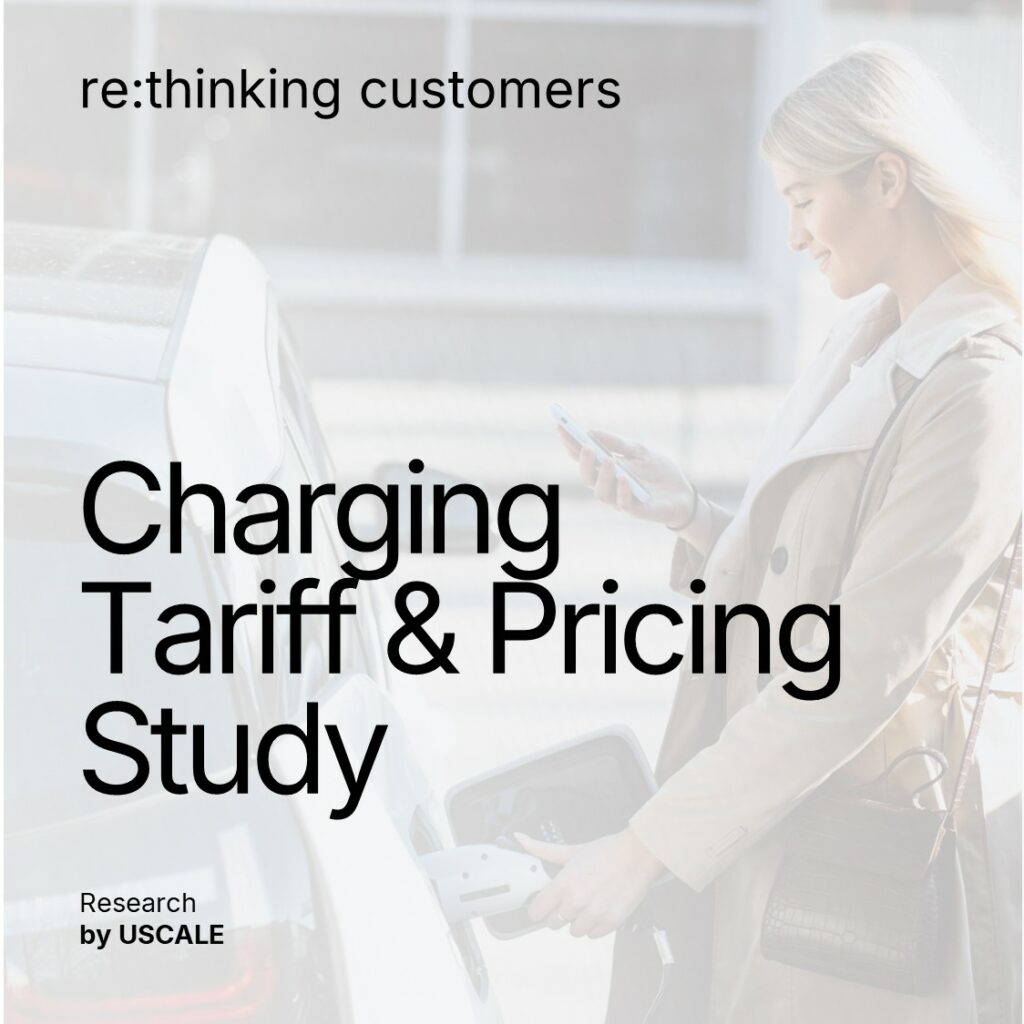Charging Tariff & Pricing StudY 2025

Pricing at the charging station: How can providers design attractive charging tariffs that maximise the utilisation of their charging parks?
The user study on charging tariffs for electric cars shows which tariff and price models electric car drivers prefer for public charging electricity and what differences there are between different target groups.
The results enable CPOs, eMSPs, energy suppliers, OEMs and consultancies to develop customer-oriented and marketable tariff models – data-based and practical.
A total of 1,722 electric car drivers from Germany who charge publicly were surveyed for the study in April 2025.
Charging Tariff & Pricing Study:
Contents and added value
Content of the Charging Tariff & Pricing Study
Segmentation criteria:
- Vehicle (make, first registration, private vs. company car, employer contribution to charging costs)
- Demographics (age, gender, income)
- Living situation (type of house, type of city)
- Driving habits (mileage per year and per weekday)
- Charging behavior (charging locations, charging frequencies, charging preferences)
- USCALE charging types ( based on charging behaviour, living situation and driving performance)
- EV adopter types (pioneers and next segment)
- Price/performance type (price-oriented, performance-oriented and undecided users)
- Tariff type (tariffs with basic fee, without basic fee or purely ad-hoc)
Customer journey for the charging tariff:
- Use of comparison portals
- Information needs and satisfaction
- Willingness to research
- Information channels for charging services used
- Favourite charging service used (eMSP/CPO)
- Last tariff change
- Preferred payment methods
- Tariff loyalty (switching frequency, switching behaviour in the event of price increases, propensity to switch for various triggers)
- KANO analysis of tariff features
CONJOINT simulator tool for tariff decisions:
- CONJOINT analysis of the ‘charging on the move’ use case.
Characteristics queried:- AC price
- DC price
- Surcharge for roaming
- Surcharge for ad-hoc payments
- Blocking fees
- Tariffs with base fee
- Combination offer with domestic electricity
- Deep dive on blocking fees:
- AC/DC
- day/night
- Deep dive into bonus programmes:
- General interest
- Interest in specific implementation alternatives
- Deep Dive to variable tariffs:
- General interest
- Willingness to use different price spreads
- Willingness to adapt the charging behaviour
- Max. change times for variable prices
- Usage drivers and barriers for variable tariffs
- Deep Dive at base fee tariffs:
- General interest
- Reasons for use
- Willingness for longer contract periods
- Usage drivers and barriers
Charging tariffs at home:
- Tariffs used, reasons against car power and variable tariffs at home
- Billing
- Factors in the choice of tariff
- Switching electricity provider and tariff
- Combination offers of home & car electricity: proactive approach by provider, use, reasons against combination offers
…and 460 final comments on the topic of charging prices and tariffs
Target group of the survey
This study is aimed at companies and experts who develop, optimise or advise on charging services for electric cars. It offers valuable user insights for:
- eMobility Service Provider (eMSPs)
to differentiate the range of tariffs and improve user loyalty. - Energy suppliers and municipal utilities
for the data-based design of new charging products and tariffs. - Vehicle manufacturers (OEMs)
to integrate user-orientated charging tariffs into their own ecosystems. - Management consultancies & market researchers
for the strategic evaluation and support of projects in the charging infrastructure market.
Whether product development, pricing or market strategy – this user study provides the data basis for making well-founded decisions.
What you get from the study
This user study gives you a comprehensive insight into the tariff preferences of active e-car drivers and thus a sound basis for making decisions about your charging products and services.
Your specific advantages:
- Accurate tariff structure
Develop public charging tariffs that are tailored to the price-performance preferences and usage reality of your target group. - Sound strategy and product decisions
Use valid data from conjoint analyses and user segmentation to optimise the tariff structure, feature set and target group approach. - Competitive edge in the dynamic tariff market
Identify relevant trends in bonus programmes, blocking fees, basic fees or variable prices at an early stage – differentiate your offering in line with real user needs. - Convincing argumentation basis for stakeholders
Justify decisions to management, investors or partners with clear user preferences, motives for change and willingness to pay
This study provides you with figures and the decision-making basis for the further development of your charging services.
Dashboard for analysis
Many crucial insights are only gained by comparing individual target groups – for example, between pioneers and the next segment or between price and performance-oriented users. In the interactive dashboard, subscribers to the study can make relevant splits themselves, e.g. by tariff type, charging behaviour or payment preference.
In the analysis tool, subscribers can carry out any analyses, correlations and statistical analyses of all study variables themselves. You also have access to all verbatim citations.
This allows offers to be tailored specifically to the needs of individual user segments – data-based, in-depth and practical.
USCALE focus studies: User studies on electromobility
Since 2018, USCALE has been systematically surveying EV drivers about their expectations and experiences at all touchpoints of the e-mobile customer journey. You can find an overview of all USCALE focus studies HERE.
We show extracts from other studies in the LinkedIn articles by USCALE and Axel Sprenger, our company founder.
If you have any questions, please contact us at contact@uscale.digital.
